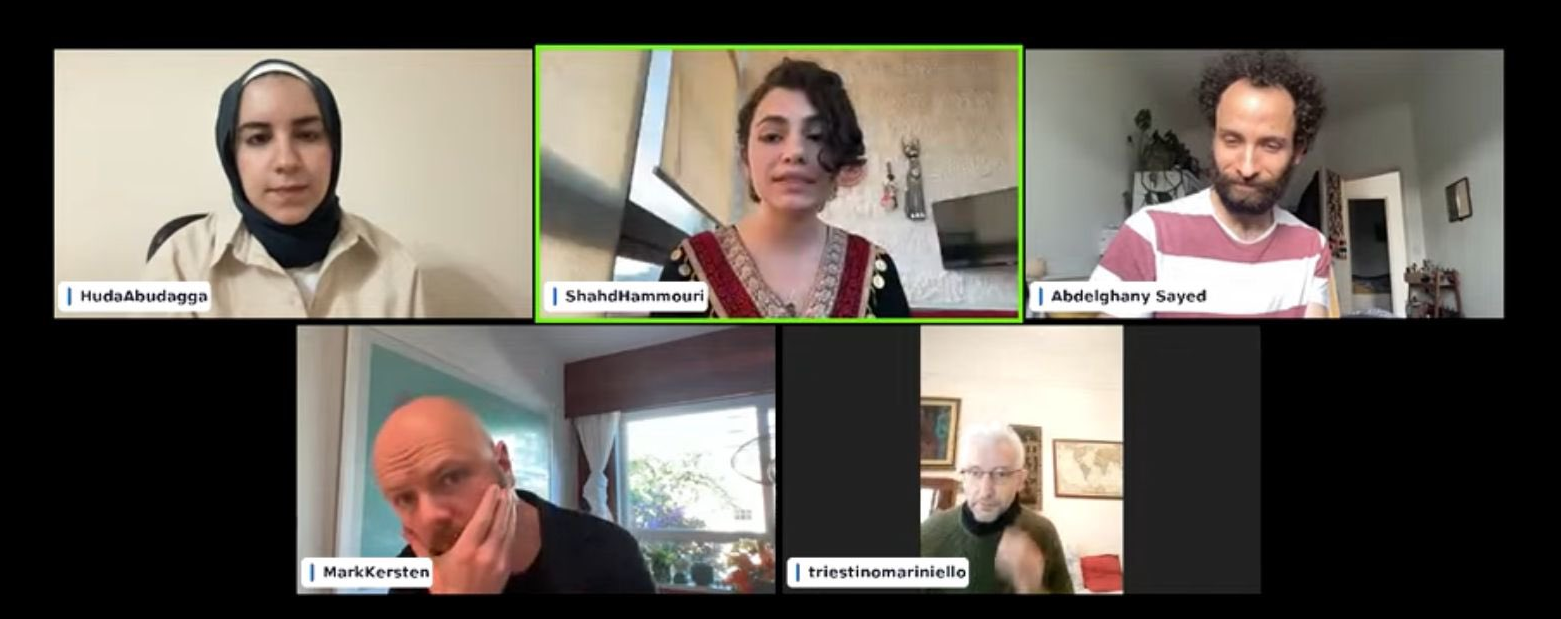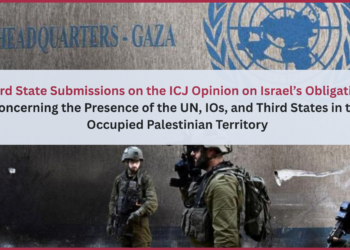Webinar Highlights ICC Role in Addressing Gaza Genocide and the Consequences of Arrest Warrants
On May 9, 2024, Law for Palestine hosted a significant webinar titled “Prioritizing Gaza Crimes at the International Criminal Court (ICC) and Anticipated Arrest Warrants.” Conducted via Zoom, the event aimed to underscore the ICC’s crucial role in upholding international justice in Palestine amid external pressures, advocate for prioritizing investigations into Gaza crimes, and discuss the issuance of arrest warrants.
The webinar, moderated by Shahd Hammouri, a Law Lecturer at Kent Law School, featured four experts: Abdel Ghany Sayed, former ICC Office of the Prosecutor staff and PhD researcher at Kent University; Huda Abu Daqqa, a researcher in International Criminal Law at Law for Palestine; Mark Kersten, Professor of International Criminal Justice at the University of the Fraser Valley; and Triestino Mariniello, a member of the legal team representing Gaza victims before the ICC.
Opening Remarks by Shahd Hammouri
Shahd Hammouri opened the webinar by invoking the Rome Statute’s preamble, highlighting the global recognition of grave crimes that threaten peace and security. She detailed the dire conditions in Gaza, emphasizing its status as the most densely populated area in the world, with a significant refugee population facing severe devastation and famine. Hammouri critiqued state representatives for downplaying these atrocities and stressed the power of law to challenge normalized violence, calling arrest warrants a beacon of hope for restoring humanity’s conscience.
Huda Abu Daqqa on Law for Palestine’s Submission
Huda Abu Daqqa presented Law for Palestine’s submission to the ICC Prosecutor, arguing that the current genocide in Gaza results from long-standing Israeli policies targeting Palestinians. The submission documents evidence of genocidal intent from Israeli leaders, linking these policies to actions against medical facilities, agricultural lands, and water systems. Drawing parallels with historical genocides in Yugoslavia and Rwanda, Abu Daqqa urged the ICC to recognize similar patterns in Israeli policies and issue arrest warrants accordingly.
She highlighted the ICC’s proactive stance in Ukraine, contrasting it with hesitancy in Palestine despite UN and international expert recognition of the crisis. Abu Daqqa called on the ICC to act immediately, warning that failure to do so undermines the court’s credibility and leaves Gazans vulnerable to ongoing genocide. She emphasized the importance of acknowledging the evidence of genocide and taking prompt legal action to uphold international justice and human rights.
Tristino Mariniello: Ensuring Access to Justice
Tristino Mariniello stressed the Palestinian case as a reminder of the universal right to access justice without discrimination. He highlighted the intense pressure on the ICC, noting Israeli media propaganda and rumors about potential ICC arrest warrants against Israeli leaders. These rumors, he said, are intended to coerce Israel’s allies into preventing such warrants and steer the court’s decision from a legal to a political outcome. He mentioned that US senators have threatened the ICC prosecutor, which he condemned as an offense against the administration of justice.
Mariniello outlined two potential approaches for the ICC. In the first scenario, the prosecutor resists political pressure, prioritizing cases based on crime gravity, suspect responsibility, and potential charges. This would involve investigating Israeli actions such as targeting civilians, property destruction, disproportionate use of force, starvation as a war crime, and the forced displacement of nearly two million civilians. In the second scenario, the ICC prioritizes its relationship with the US, succumbing to political pressure, which would tarnish its image as an independent institution. This approach might focus solely on crimes by Israeli settlers or minor offenses, avoiding major Israeli leaders.
He concluded by centering the voices of Gazan victims, emphasizing their right to justice and the necessity for the ICC to prioritize plausible accusations of genocide.
Abdel Ghany Sayed: ICC Policy and Case Prioritization
Abdel Ghany Sayed discussed the ICC’s 2016 policy paper on case selection and prioritization, highlighting its biases against perceived illiberal actors and non state actors. He explained that the policy paper outlines both quantitative and qualitative measures for case selection. Quantitative standards relate to the number of victims, while qualitative measures consider crime gravity, the nature of crimes (such as those against children or involving sexual violence), and their widespread impact.
Sayed noted that the ICC deprioritized the Gaza aid flotilla case due to the limited number of victims and the lack of intent to kill international activists. Through case law, Sayed explained that the ICC often deprioritizes cases involving state and liberal actors, as demonstrated by the de-prioritization of the case against the US in Afghanstan.
Sayed concluded that if the ICC decides to prosecute in the situation in Palestine, it would likely focus on prosecuting Hamas or both sides of the conflict, instead of prioritizing cases with the largest number of victims or more severe crimes. Sayed emphasized that if the prosecutor’s office follows its prioritization policy, the 2023-2024 genocide in Gaza should take precedence over all other crimes. Within its context, the prosecutor’s office can then investigate all other related crimes. Sayed later published a detailed article on this topic.
Mark Kersten: Admissibility and Enforcement of ICC Warrants
Mark Kersten discussed the ICC’s role as an advocate for victims, emphasizing that access to crime scenes is crucial in war crimes investigations. However, he noted that certain policy-oriented crimes, such as starvation and denial of humanitarian aid, do not require direct access. Kersten suggested that Israel’s strong reaction to potential arrest warrants indicates their imminence, due to Israel’s sophisticated intelligence network.
Kersten clarified that Israel cannot challenge ICC case admissibility unless it is already investigating the same individuals for the same conduct. He explained the process of issuing warrants, noting that the prosecutor must apply for them beforehand, which may not have occurred due to external pressures. He highlighted the procedural issue of warrant publicity, stating that ICC arrest warrants are typically made public rather than sealed.
He elaborated on the implications of issuing warrants, noting that 124 state parties to the Rome Statute are obligated to enforce them and surrender individuals to the ICC. Non-state parties like the US and Russia are not bound by this obligation. He also pointed out the challenges for countries like Canada in selling military weapons to states whose leaders are wanted by the ICC. Kersten concluded by warning that misinformation about Israel’s legal system capacity hampers ICC rulings, and while immediate enforcement of warrants is unlikely, their eventual execution will catch many by surprise.
The panel discussion concluded with questions about the potential long-term impacts of the ICC yielding to political pressure, which could undermine its legitimacy and transparency. Criticisms were also raised regarding biases within the Office of the Prosecutor (OTP) and the global West, particularly how the ICC categorizes Palestinian hostages as detainees while labeling Israeli hostages as mere hostages. The discussion also illuminated Law for Palestine’s submission to the ICC and the serious implications of the ICC’s inaction.
- For the full recording: Click
ICC Gaza Genocide Warrants ICC Gaza Genocide Warrants





